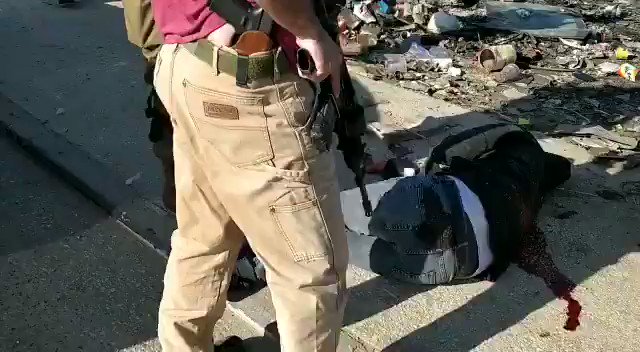 April 12, 2019: Maisara Mousa Ali Abu Shallouf, 15, was shot and killed by Israeli soldiers at the weekly Great March Processions in the besieged Gaza Strip. The soldiers also injured 55 other protesters, including two medics.
April 12, 2019: Maisara Mousa Ali Abu Shallouf, 15, was shot and killed by Israeli soldiers at the weekly Great March Processions in the besieged Gaza Strip. The soldiers also injured 55 other protesters, including two medics.
The Palestinian Health Ministry reported that the soldiers killed Maisara by shooting him with live fire in the abdomen, east of Jabalia, in the northern part of the Gaza Strip.
The soldiers also fired live rounds and gas bombs at medics trying to reach the child to provide him with urgently needed medical help.
Dr. Ashraf al-Qedra, the spokesperson of the Health Ministry In Gaza, said the soldiers shot 66 Palestinians, including 15 children and six women, in addition to two medics.
It added that one of the wounded Palestinians suffered life-threatening wounds.
The Health Ministry also stated that the soldiers shot two medics and caused others to suffer the effects of teargas inhalation.
The protests took place in five areas in the eastern parts of the Gaza Strip, from Beit Lahia, Beit Hanoun and Jabalia, in the northern part, to Gaza city and central Gaza, in addition to Khan Younis and Rafah, in the southern part of the coastal region.
Media sources in Gaza said the army used high-velocity gas bombs, and live fire, targeting many areas far away from the perimeter fence.
They added that the soldiers also targeted several ambulances, medics and journalists, with sniper fire, in addition to the high-velocity gas bombs.
The protests this week were also in support and solidarity with the hunger striking detainees in Israeli prisons, facing constant violations and denied basic rights.
Maisara was from Jabalia, in the northern part of the Gaza Strip. Source: IMEMC

 April 2, 2019: Mohammad Abdul-Mon’em Abdel-Fattah, 23, was killed when an Israeli settler opened fire on him near Beita town, south of Nablus.
April 2, 2019: Mohammad Abdul-Mon’em Abdel-Fattah, 23, was killed when an Israeli settler opened fire on him near Beita town, south of Nablus.
 April 1, 2019: Fares Abu Hajras, 26, died from serious wounds he suffered the previous Saturday when Israeli soldiers shot him east of Khan Younis, in the southern part of the Gaza Strip, during the Land Day protest.
April 1, 2019: Fares Abu Hajras, 26, died from serious wounds he suffered the previous Saturday when Israeli soldiers shot him east of Khan Younis, in the southern part of the Gaza Strip, during the Land Day protest. April 1, 2019: Mohammad Ali Dar Adwan, 23, was shot and killed by Israeli forces who invaded Qalandia refugee camp, north of occupied Jerusalem, on Monday, and attacked local protesters, wounding at least two other young men.
April 1, 2019: Mohammad Ali Dar Adwan, 23, was shot and killed by Israeli forces who invaded Qalandia refugee camp, north of occupied Jerusalem, on Monday, and attacked local protesters, wounding at least two other young men. March 30, 2019: Bilal Mahmoud Najjar (Abu Jamous), 17, died from serious wounds suffered earlier after the soldiers shot him with live fire at a protest east of Khan Younis, as part of the Land Day commemoration on March 30th, 2019.
March 30, 2019: Bilal Mahmoud Najjar (Abu Jamous), 17, died from serious wounds suffered earlier after the soldiers shot him with live fire at a protest east of Khan Younis, as part of the Land Day commemoration on March 30th, 2019. March 30, 2019: Tamer Hashem Abu al-Kheir, 17, was killed when Israeli soldiers hit him with a live round in the chest, east of Khan Younis, in the southern part of the coastal region, during the Land Day protest March 30th, 2019.
March 30, 2019: Tamer Hashem Abu al-Kheir, 17, was killed when Israeli soldiers hit him with a live round in the chest, east of Khan Younis, in the southern part of the coastal region, during the Land Day protest March 30th, 2019. March 30, 2019:
March 30, 2019:  March 30, 2019: Mohammad Jihad Sa’ad, 20, was shot and killed by Israeli sharpshooters on Saturday morning, east of Gaza city, before the Great Return March processions started.
March 30, 2019: Mohammad Jihad Sa’ad, 20, was shot and killed by Israeli sharpshooters on Saturday morning, east of Gaza city, before the Great Return March processions started. March 26, 2019: Sajid Abdel Hakim Helmi Mizhir, 17, a young Palestinian paramedic, was shot and killed by Israeli forces who opened fire at him despite the fact that he was wearing his clearly marked medic vest. He died of his wounds in the hospital soon after.
March 26, 2019: Sajid Abdel Hakim Helmi Mizhir, 17, a young Palestinian paramedic, was shot and killed by Israeli forces who opened fire at him despite the fact that he was wearing his clearly marked medic vest. He died of his wounds in the hospital soon after. March 24, 2019: Habeeb al-Masri, 24, died from serious wounds he suffered on Saturday night, after Israeli soldiers shot him in the northern part of the coastal region.
March 24, 2019: Habeeb al-Masri, 24, died from serious wounds he suffered on Saturday night, after Israeli soldiers shot him in the northern part of the coastal region.